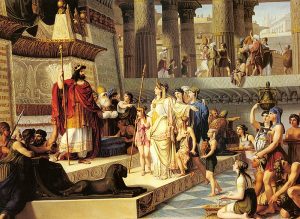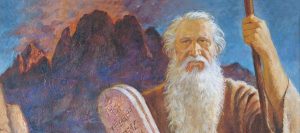Come, Follow Me: March 9 — 15



Jacob, Nephi’s brother, had been faithful from his youth and had seen Christ even while Nephi was the prophet and leader of their family and friends. Nephi ordained Jacob to the ministry and they were both spiritual leaders among the people until Nephi’s death.
In the final chapters of 2 Nephi, we see Nephi, who had received great views of the future and insights into gospel truths, mourning for his people. The Lord had constrained him from teaching any concepts beyond faith, repentance, baptism, and the receiving of the Holy Ghost, the basic principles of the gospel. The people could not bear any more, neither would they receive.
Aided by his brother Joseph, who was also faithful, Jacob continued to encourage the Nephites to improve. At the beginning of Jacob 1, about 55 years had passed since the family had left Jerusalem. How many of them there were at this time we don’t know. But it wasn’t a huge group. Still, they had managed to define themselves in comparison to others by their riches or lack thereof.
Jacob had been commanded to write upon the small plates, mostly concerning spiritual—and not historical—things. Nephi and Jacob had great anxiety for their people because they had seen in vision their utter destruction. They wanted to save them from this, if possible, but they also wanted to leave a record for the Lamanites who would survive them, hoping to bring them back to the Savior (verses 1-5).
Because Jacob and Nephi knew of Christ and His kingdom through revelation, they worked hard to bring the Nephites to the Savior. They knew what had happened to the Israelites during the Exodus, how they had offended God and refused to enter into His rest. They hoped to avoid provoking God in that way (verse 7).

Before Nephi died, he anointed someone to be the king and ruler over the people. Remember that Nephi himself had refused to be king and there was plenty of counsel from the scriptures and from Nephi himself about how kings can oppress their people. Still, at this point, Nephi acquiesced (verse 9).
From this point on, the kings were called Nephi. This was a title, rather than a personal name. The pattern would have been Nephi I for the first king, Nephi II for the second king, etc. A pattern such as this can be found in other cultures, such as the Egyptians.
In verses 13 and 14, we see who comprised what were now called Nephites and Lamanites. In verse 15, we see that the Nephites under the second king were beginning to harden. They began to desire to have multiple wives and concubines. Note that this means that all of their needs for food, clothing, and shelter had been met and they were “graduating” into the stage where they could decide what to do with their excess. The lifestyle they now wanted can only become reality where there is luxury. Why is that so? How do you see that same pattern in more recent history? Discuss.
The Nephites began to search for gold and silver. These metals (except for the gold alloyed into the “gold” plates) were decorative metals, not metals for making tools (verse 16). Those who could decorate themselves or who had the largest stashes of these precious metals were lifted up in pride. Compare this situation to our society today. Rather than hoarding precious metals, what do people prize and “collect” to display their wealth?

Having been consecrated as priests and teachers, Jacob and Joseph taught the people in the temple (verses 17 – 19). They did not want the guilt or responsibility for their people’s sins to be because they hadn’t been taught. In our day, who has responsibility to teach the gospel and could be guilty for the sins of others?
Jacob begins to teach the people and is actually having a hard time talking about the things that are necessary to discuss. His anxiety for his people overcomes his embarrassment but readers can still sense the tough time he’s having. Part of it is that his audience is mixed. Along with the guilty there are children and others who remain in innocence and shouldn’t have to be exposed to these things (verses 1 – 3). What are some subjects parents are having to talk to their children about today that might cause them to feel this same way?
God has revealed to Jacob that the people are beginning to sin. This is abominable to Jacob and abominable to God. What blessings and gifts had the Nephites received that should have brought them to righteousness? Do we have similar blessings and gifts? (See verses 5 – 9.) Jacob wishes he could stand at the temple and shower his people with blessings for their righteousness, but he can’t. For those who are parents, how do you feel when one of your children transgresses a rule and you have to discipline them?
Jacob goes on to talk about how some people have found more precious metals than others and then have become prideful. When Jacob talks about the “costliness of their apparel” how would this have been different for them than for us in our time? How would it have been similar? (See verses 12 – 13.)
In verse 15, Jacob reminds those who are prideful that with one glance, God could smite them to the dust. Why do we fail to realize the very temporary nature of our status and riches? Why are we so impressed by them? How much effort are we willing to expend to attain to these temporary things? How much effort are we willing to expend for eternal things?
In verse 17, Jacob counsels his people to think of their brethren as equals and to be “familiar and free” with their substance, so they can also be rich. How do we accomplish this in our day? One tourist visiting New York City observed several people begging for money on the subway. Although this happened day in and day out during her trip, she only once witnessed a subway passenger offer a dollar to a needy person. The rest of the time people simply ignored them. Many people justify not giving handouts because they are worried that the person asking for money will use it to buy drugs or alcohol. How can we still be generous and thoughtful of those less fortunate?
Jacob then teaches the Nephites (and us) to seek the kingdom of God first and then to seek riches for the intent to do good (verse 19). He chastises those who have “afflicted their neighbors” because of their pride. Are any of us guilty of this? In every case where the Lord has destroyed societies that were filled with iniquity, this was one of their most profound sins. Why is it so serious to the Lord?
Jacob wishes he were finished chastising his people, but he has more serious things to address. The men were seeking multiple wives and concubines and excusing themselves because of David and Solomon of old (verse 23). In verse 24 it says, “Behold, David and Solomon truly had many wives and concubines, which thing was abominable before me, saith the Lord.” In the Doctrine and Covenants, Section 132: 38, 39, it says,
“David also received many wives and concubines, and also Solomon and Moses my servants, as also many others of my servants, from the beginning of creation until this time; and in nothing did they sin save in those things which they received not of me.
David’s wives and concubines were given unto him of me, by the hand of Nathan, my servant, and others of the prophets who had the keys of this power; and in none of these things did he sin against me save in the case of Uriah and his wife; and, therefore he hath fallen from his exaltation, and received his portion; and he shall not inherit them out of the world, for I gave them unto another, saith the Lord.”
These scriptural statements might seem to contradict each other, but they don’t. Solomon married out of the covenant, partly for political alliances and partly to satisfy his own desires. As he aged, his wives ruined his testimony and faithfulness to the gospel. David would not have pursued Bathsheba if he had been limited to one wife. Why does the practice of polygamy require great righteousness?

Many people criticize The Church of Jesus Christ of Latter-day Saints and its historical practice of polygamy by quoting Jacob 2: 27 where it says to only have one wife:
Wherefore, my brethren, hear me, and hearken to the word of the Lord: For there shall not any man among you have save it be one wife, and concubines he shall have none:…
Why is it necessary to include verse 30?:
For if I will, saith the Lord of Hosts, raise up seed unto me, I will command my people; otherwise they shall hearken unto these things.
When the Latter-day Saints were commanded to practice plural marriage for 50 years, it was difficult for everyone in the Church. But it raised up seed to the Lord’s most faithful priesthood leaders and produced generations of leaders and people who were strong in the faith. How does this fit with what Jacob says in verse 30?
In verse 31, the Lord says He has seen the sorrow and heard the mourning of righteous daughters because of the men. In verse 33, He says, “For they shall not lead away captive the daughters of my people because of their tenderness, save I shall visit them with a sore cursing even unto destruction.”
In verse 35, Jacob says the iniquity of the Nephites is greater than the Lamanites because of the way they’ve wounded their wives and their children.
Jacob turns to address those who are pure in heart. He promises that God will console them and send down justice on those who seek to destroy them. To those who are willfully sinning, he prophesies that the Lamanites will become a scourge for them. What does this say about how God cares for us?
The Lamanites have continued to have only one wife and have not committed whoredoms. There is love within their homes (verses 5 – 7). Because of this, God will not destroy them. God commands the Nephites not to revile against the Lamanites any longer but to remember their own filthiness.
Jacob talks about why they have kept a record on metal plates. They hope their brethren and their children will receive the record gratefully.
For, for this intent have we written these things, that they may know that we knew of Christ, and we had a hope of his glory many hundred years before his coming; and not only we ourselves had a hope of his glory, but also all the holy prophets which were before us.
Behold, they believed in Christ and worshipped the Father in his name, and also we worship the Father in his name. And for this intent we keep the Law of Moses, it pointing our souls to him; and for this cause it is sanctified unto us in righteousness…. (verses 4, 5).
It is difficult for many to see the Law of Moses as leading us to Christ. They visualize it as a law of retribution (an eye for an eye) instead of a law of restitution. In the process of repentance, the steps are to desire to repent, to confess, to restore what we have injured or broken, and then to turn from sin and keep the commandments. Go to Doctrine and Covenants, Section 98. This “law governing war” is fully composed of Old Testament law. In fact, in verse 32, it says, “Behold, this is the law I gave unto my servant Nephi, and thy fathers Joseph, and Jacob, and Isaac, and Abraham, and all mine ancient prophets and apostles.”
Notice that it says in verse 44 it says to “reward four-fold in all things wherewith he has trespassed against you.” This is the pattern the Israelites and the Jews followed according to the Law of Moses.

In focusing on faith, repentance, and sacrifice, the Law of Moses provided the foundation upon which the higher law could be built.
In verse 6 of Jacob 4, Jacob says,
Wherefore, we search the prophets, and we have many revelations and the spirit of prophecy; and having all these witnesses we obtain a hope, and our faith becometh unshaken, insomuch that we truly can command in the name of Jesus and the very trees obey us, or the mountains, or the waves of the sea.
Using their priesthood power in God’s name, Jacob and Joseph and perhaps others could control the forces of nature and move mountains. The people of Enoch were also able to do such things.
In verse 7, however, Jacob says that God shows them their weakness. What is the difference between “weakness” before God and “weaknesses.” How is weakness necessary for us? The answer is in this verse.
Jacob praises the power and goodness of God and then counsels us in verse 11 to be reconciled to God through the atonement of Christ. What does it mean to be reconciled to God? When we sin and need to repent what does it mean to realize we have offended God? How does that help us to repent?
In verses 14 and 15, Jacob talks about the stumbling of the Jews. How and why did they stumble? Can this same thing happen to us?